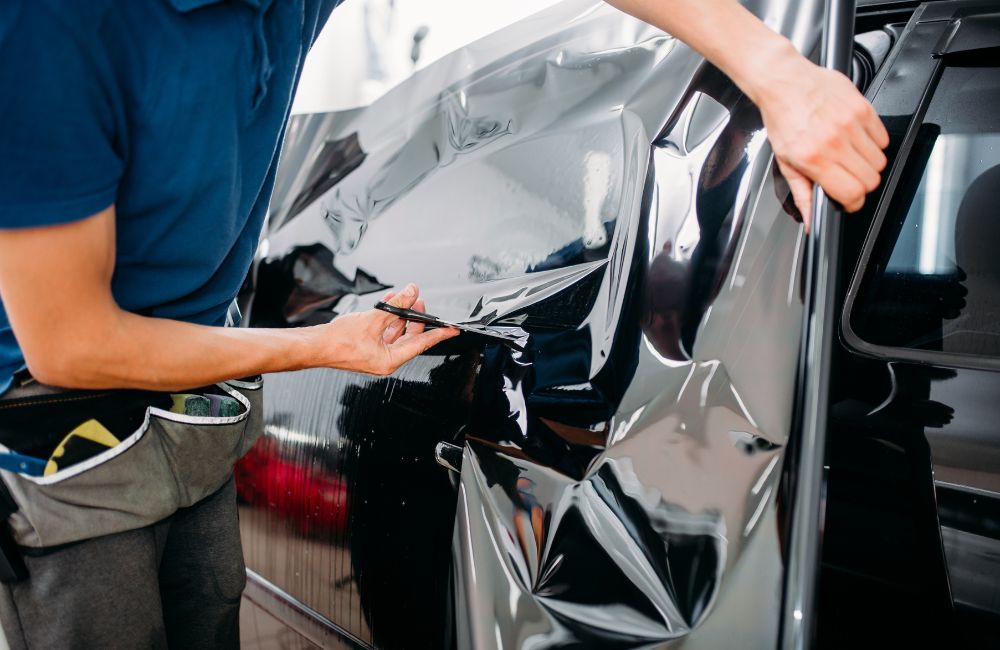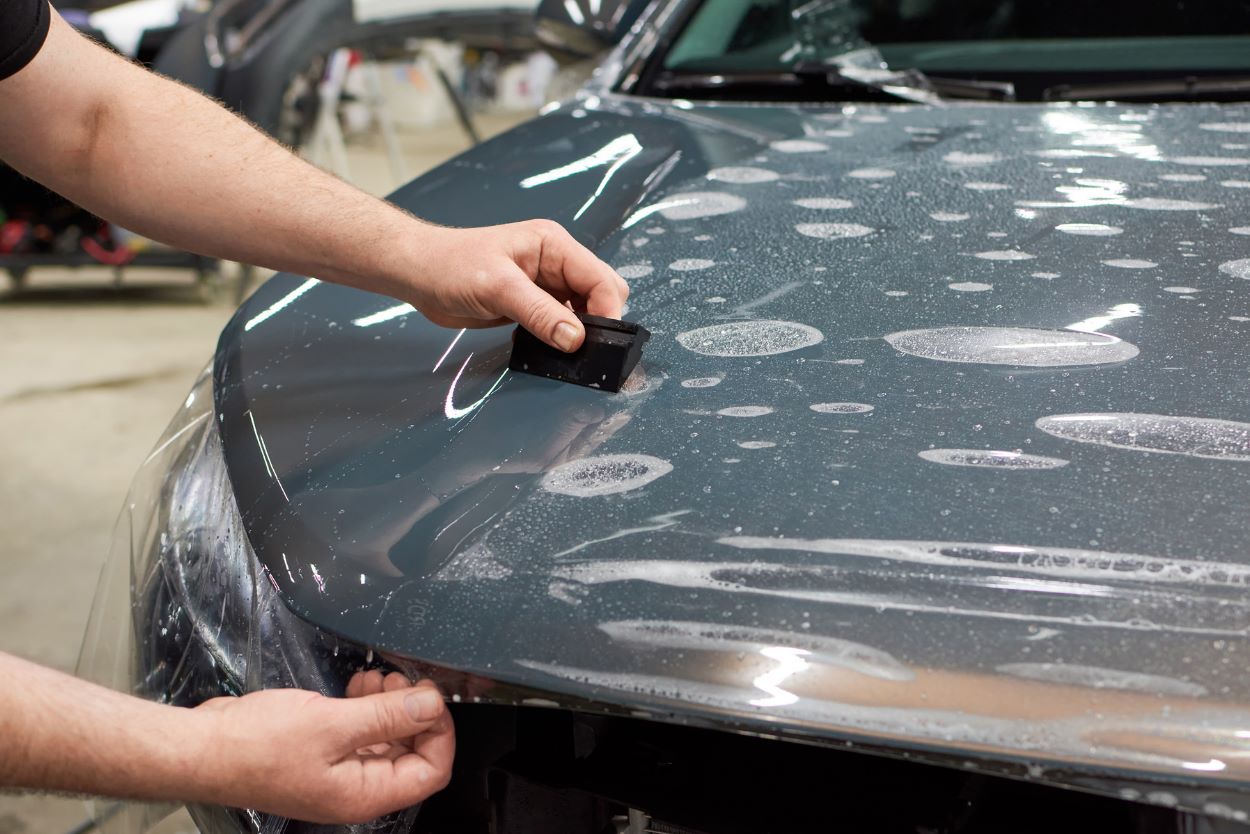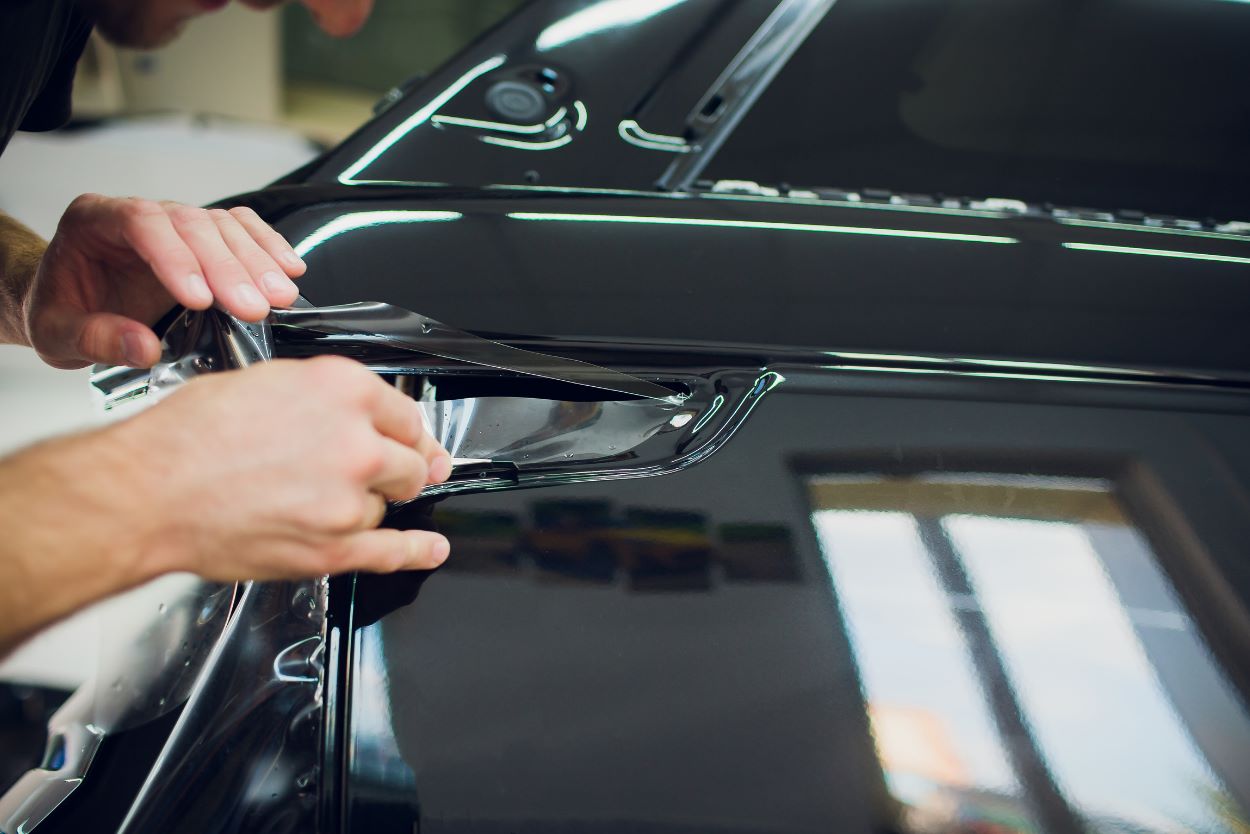Custom car wraps have changed the way people personalize and protect their vehicles. In the U.S. alone, the market for wraps and other body finishing products saw a 15% growth between 2018 and 2021, according to the Specialty Equipment Market Association (SEMA).
These wraps not only enhance the visual appeal of vehicles but also provide a layer of protection against minor scratches and the elements. However, the success of custom car wraps heavily depends on proper installation and maintenance. Without the right approach, what could be a stunning transformation might turn into a costly mistake.
Here are the top six mistakes to avoid when installing custom car wraps in Danbury, CT, ensuring your investment yields the best results.
Table of Contents
Key Takeaways
Why Proper Installation Matters
Top 6 Mistakes to Avoid When Installing Custom Car Wraps
1. Choosing a Low-Quality Vinyl
2. Applying the Wrap in Extreme Temperatures
3. Not Using a Professional Installer
4. Using the Wrong Tools
5. Skipping the Cleaning Process
6. Neglecting Maintenance
Frequently Asked Questions
Transform Your Vehicle with Car Wrap – Illmatic Wraps CT Today!
| Key Takeaways ✔ Proper installation of custom car wraps enhances appearance and longevity. ✔ High-quality vinyl is crucial for durability, better adhesion, and ease of installation. ✔ Extreme temperatures can cause vinyl to peel, bubble, or misalign, making climate control essential. ✔ Hiring a professional installer ensures precision, access to the right tools, and long-lasting results. ✔ Using the correct tools is vital for a smooth and bubble-free installation of custom car wraps. ✔ Thorough cleaning of the vehicle’s surface before installation prevents poor adhesion and vinyl failure. ✔ Neglecting maintenance can lead to fading, peeling, and reduced lifespan of the custom car wrap. ✔ Regular hand washing and proper storage extend the life and appearance of custom car wraps. |

Why Proper Installation Matters
When it comes to custom car wraps, proper installation is crucial for a number of reasons. A correctly installed wrap not only looks professional but also extends the lifespan of the vinyl. On the other hand, improper installation can lead to a host of problems.
Custom car wraps are a significant investment, and like any investment, you want to ensure it pays off. The global automotive wrap films market is projected to expand at a compound annual growth rate (CAGR) of 22.1% from 2024 to 2030. This growth underscores the increasing demand and importance of quality in custom car wraps. When installed correctly, custom car wraps can:
- Enhance the Vehicle’s Appearance: A well-applied wrap can give your car a fresh, unique look that stands out on the road.
- Protect the Original Paint: Custom car wraps provide a protective barrier against minor scratches, UV rays, and other environmental factors.
- Increase Resale Value: A professionally installed wrap can protect the vehicle’s original paint, preserving its condition and potentially increasing its resale value.
- Long-Lasting Results: Proper installation ensures that the wrap remains in good condition for several years, reducing the need for frequent replacements.
However, improper installation can lead to several issues, including:
- Peeling and Bubbling: If the wrap is not applied correctly, air bubbles can form underneath, causing the vinyl to peel over time.
- Poor Adhesion: Failure to properly clean and prepare the vehicle’s surface can result in the vinyl not adhering correctly, leading to premature wear and tear.
- Damage to the Paint: Using the wrong tools or techniques can scratch or otherwise damage the vehicle’s paint, which may require costly repairs.
Top 6 Mistakes to Avoid When Installing Custom Car Wraps
When it comes to applying custom car wraps, avoiding common pitfalls is essential to achieving a flawless finish that enhances both the appearance and longevity of your vehicle’s wrap.
1. Choosing a Low-Quality Vinyl
One of the most common and detrimental mistakes people make when installing custom car wraps is opting for low-quality vinyl. While it might be tempting to save a few bucks by choosing a cheaper material, this decision can lead to numerous problems down the line.
Why Quality Matters
High-quality vinyl is designed to withstand the rigors of daily driving, including exposure to sunlight, rain, and extreme temperatures. Cheap vinyl, on the other hand, is prone to fading, peeling, and cracking, often within a short period. This not only detracts from the appearance of your vehicle but also undermines the protective benefits of custom car wraps.
- Durability: Quality vinyl is more resistant to wear and tear, ensuring that the wrap remains intact and vibrant for years.
- Adhesion: Higher-grade vinyl has superior adhesive properties, which means it sticks better to the vehicle’s surface and is less likely to peel or bubble.
- Ease of Installation: Premium vinyl is easier to work with, allowing for smoother application and better overall results.
How to Choose Quality Vinyl
When selecting vinyl for your custom car wraps, it’s important to consider the following factors:
- Brand Reputation: Stick with well-known brands like 3M, Avery Dennison, and Oracal, which are trusted in the industry for their high-quality materials.
- Thickness: Thicker vinyl tends to be more durable and offers better protection, although it may be slightly more challenging to apply.
- Finish Options: Look for a vinyl that offers a variety of finishes (e.g., gloss, matte, satin) to match your desired aesthetic.
- Warranty: Reputable manufacturers often offer warranties on their vinyl, providing peace of mind that the material will perform as expected.
2. Applying the Wrap in Extreme Temperatures
Another major mistake when installing custom car wraps is attempting to apply the vinyl in extreme temperatures. Whether it’s too hot or too cold, these conditions can significantly affect the adhesive properties of the vinyl, leading to a host of problems.
Ideal Conditions for Installation
The best temperature range for installing custom car wraps is between 60°F and 80°F (15°C to 27°C). At this temperature, the vinyl remains pliable and the adhesive works effectively, allowing for a smooth application.
- Cold Weather Risks: In cold weather, the adhesive may not activate properly, causing the vinyl to not stick as it should. This can result in the wrap lifting at the edges or even completely peeling off in certain areas.
- Hot Weather Risks: Conversely, in hot weather, the vinyl can become too soft, making it difficult to apply evenly. Excessive heat can also cause the adhesive to bond too quickly, leaving no room for adjustments and leading to potential misalignment.
Tips for Controlling Environmental Factors
To ensure the best results when installing custom car wraps, it’s crucial to control the environment as much as possible.
- Install Indoors: Whenever possible, install custom car wraps indoors in a climate-controlled environment. This allows you to maintain a stable temperature and avoid issues caused by wind, dust, or moisture.
- Time of Day: If you must install the wrap outdoors, aim to do so early in the morning or late in the afternoon when temperatures are more moderate.
- Use Heat Guns Wisely: In cooler conditions, you can use a heat gun to gently warm the vinyl and improve its flexibility. However, be cautious not to overheat the material, as this can cause it to warp.
3. Not Using a Professional Installer
While the idea of installing custom car wraps yourself or hiring an inexperienced installer might seem appealing to save money, this decision can backfire. Custom car wraps require precision, skill, and experience to apply correctly. Attempting a DIY installation or going with a less experienced installer often leads to subpar results.
Benefits of Hiring a Professional
Professional installers bring a wealth of expertise and knowledge to the table, ensuring that your custom car wraps are applied flawlessly.
- Experience with Different Surfaces: Professionals understand how to handle different surfaces and contours, ensuring a smooth application even on complex vehicle shapes.
- Access to the Right Tools: Professional installers have access to specialized tools that are essential for a successful installation, such as squeegees, heat guns, and precision knives.
- Attention to Detail: A professional installer pays close attention to every detail, from the alignment of the vinyl to the smoothing of edges, ensuring a perfect finish.
- Warranties and Guarantees: Most professional installers offer warranties on their work, giving you peace of mind that any issues will be addressed without additional cost.
What to Look for in a Professional Installer
When choosing a professional to install your custom car wraps, consider the following factors:
- Reputation: Look for installers with a strong reputation and positive customer reviews. Word-of-mouth recommendations and online testimonials can provide valuable insights into their work quality.
- Portfolio: Ask to see examples of previous work, particularly on vehicles similar to yours. This will give you a better idea of their experience and the quality of their installations.
- Certifications: Some installers are certified by vinyl manufacturers, indicating that they have undergone training and are qualified to work with specific products.
4. Using the Wrong Tools
The tools used during the installation of custom car wraps are just as important as the vinyl itself. Using the wrong tools can lead to a range of problems, from damaging the vinyl to creating an uneven finish.
Essential Tools for Installation
To achieve a flawless installation, you’ll need the following tools:
- Squeegees: These are essential for smoothing out the vinyl and ensuring it adheres properly to the surface without bubbles or wrinkles. Squeegees come in various sizes and materials; a soft, flexible squeegee is ideal for working around curves and edges.
- Heat Guns: A heat gun is used to make the vinyl more pliable, especially around curves and edges. It also helps to activate the adhesive, ensuring a strong bond. Be sure to use the heat gun at the correct distance and temperature to avoid overheating the vinyl.
- Knives and Blades: Precision cutting tools are necessary for trimming excess vinyl and making clean cuts around edges and contours. Use a sharp blade to avoid tearing the vinyl, and always cut at a slight angle to prevent the material from lifting.
- Application Gloves: These gloves help to prevent fingerprints and smudges on the vinyl during installation, ensuring a clean, professional finish.
Using the Right Tools Correctly
Even with the right tools, it’s important to know how to use them correctly to avoid common pitfalls.
- Squeegee Technique: Apply firm, even pressure when using a squeegee, and work from the center of the vinyl outward to push out any air bubbles.
- Heat Application: Use the heat gun sparingly, applying heat in short bursts to avoid overheating the vinyl. Move the heat gun continuously to ensure even warming.
- Precision Cutting: Take your time when cutting the vinyl, especially around edges and corners. A clean cut is essential for a seamless finish and helps to prevent the vinyl from lifting.
5. Skipping the Cleaning Process
One of the most critical steps in the installation of custom car wraps is preparing the vehicle’s surface. Skipping or rushing through the cleaning process is a mistake that can lead to poor adhesion and premature failure of the wrap.
Why Cleaning is Essential
The vehicle’s surface must be thoroughly cleaned and free of any contaminants before applying custom car wraps.
- Dirt and Debris: Any dirt or debris left on the surface can create bumps under the vinyl, leading to an uneven finish. These particles can also weaken the adhesive bond, causing the vinyl to peel away from the vehicle.
- Grease and Oils: Oils from your skin, waxes, or other substances can create a barrier between the vinyl and the vehicle. This prevents proper adhesion and leads to premature failure of the wrap.
Proper Cleaning Steps
To ensure a successful installation, follow these steps to properly clean and prepare the vehicle:
- Wash the Vehicle: Start by washing the vehicle thoroughly with a mild detergent to remove dirt, dust, and grime. Avoid using waxes or polishes, as these can leave a residue that interferes with the adhesive.
- Degrease: After washing, use a degreaser to remove any remaining oils or contaminants from the surface. Isopropyl alcohol is a commonly used degreaser that effectively cleans without leaving residue.
- Dry the Surface: Once the vehicle is clean, dry it thoroughly with a microfiber cloth to ensure no moisture remains. Any remaining water droplets can interfere with the adhesive and cause the vinyl to lift.
- Final Inspection: Before applying the vinyl, inspect the surface closely to ensure it’s completely clean and free of any particles. Even a small speck of dust can cause problems during installation.
6. Neglecting Maintenance
After successfully installing custom car wraps, the work isn’t over. Neglecting regular maintenance is a common mistake that can significantly reduce the lifespan of the wrap, causing it to fade, peel, or crack prematurely.
Routine Maintenance
Proper maintenance is essential for keeping your custom car wraps looking vibrant and ensuring they last as long as possible.
- Regular Cleaning: Dirt, dust, and road grime can accumulate on the surface of the vinyl, dulling its appearance over time. Regular cleaning helps to maintain the wrap’s finish and prevent buildup that can cause long-term damage.
- Protection from the Elements: Custom car wraps are exposed to various environmental factors, including UV rays, rain, and pollution. Over time, these elements can cause the vinyl to fade or degrade, reducing its effectiveness and aesthetic appeal.
- Addressing Damage Promptly: Small areas of damage, such as lifting edges or minor scratches, should be addressed immediately to prevent them from worsening and compromising the integrity of the entire wrap.
Practical Tips
To keep your custom car wraps in top condition, follow these maintenance tips:
- Wash by Hand: Always wash your wrapped vehicle by hand using a mild soap and water. Avoid automated car washes with harsh brushes that can scratch the vinyl.
- Avoid Abrasive Cleaners: Use gentle, non-abrasive cleaning products that are specifically designed for vinyl wraps. Harsh chemicals and solvents can damage the wrap and cause it to deteriorate.
- Apply a Protective Coating: Consider applying a protective coating designed for vinyl wraps to help shield the wrap from UV rays and other environmental factors. This can extend the life of the wrap and keep it looking vibrant.
- Store the Vehicle Properly: Whenever possible, park your vehicle in a garage or shaded area to protect it from prolonged exposure to the sun. If outdoor parking is necessary, consider using a car cover to protect the wrap.

Frequently Asked Questions
Can custom car wraps be used on leased vehicles?
Yes, custom car wraps can be applied to leased vehicles, making it a popular option for temporary customization. The wrap can be removed without damaging the paint, which is essential when returning a leased vehicle. However, it’s crucial to check your lease agreement to ensure that modifications like wraps are permitted.
What types of designs can be printed on custom car wraps?
Custom car wraps offer incredible versatility, allowing for virtually any design to be printed, from simple solid colors to complex patterns and full photographic images. This makes them an ideal choice for both personal customization and business branding. The high-quality printing technology ensures vibrant colors and sharp details, making your vehicle stand out.
Are custom car wraps environmentally friendly?
Custom car wraps are generally more environmentally friendly than traditional paint jobs because they produce less waste and use fewer harmful chemicals. Additionally, many vinyl wraps can be recycled, further reducing their environmental impact. This makes wraps a more sustainable option for those looking to modify their vehicle’s appearance.
Do custom car wraps affect a vehicle’s warranty?
Custom car wraps typically do not affect a vehicle’s warranty, especially if they are applied and removed by professionals. Most manufacturers consider wraps a non-permanent modification, similar to decals or stickers. However, it’s always best to consult with your manufacturer or dealer before applying a wrap to ensure there are no specific restrictions.
Can custom car wraps be repaired if damaged?
Yes, if a section of a custom car wrap is damaged, it can often be repaired or replaced without the need to redo the entire wrap. This is one of the significant advantages of wraps over traditional paint jobs. The repair process involves matching the design and reapplying the vinyl only to the affected area, saving time and cost.

Transform Your Vehicle with Car Wrap – Illmatic Wraps CT Today!
If you’re ready to give your vehicle a stunning new look, Car Wrap – Illmatic Wraps CT in Danbury, CT, is here to help. Our team of professionals specializes in high-quality custom car wraps that enhance your vehicle’s appearance and protect its original paint. Whether you’re in Danbury, CT, or the surrounding area, trust Car Wrap – Illmatic Wraps CT to deliver flawless results that will make your car stand out on the road.
Contact us today to get started on your custom car wrap journey!




